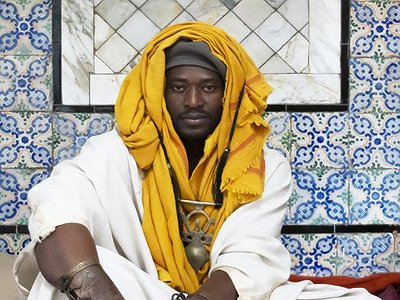Name: Alune Wade
Occupation: Singer, songwriter, bassist
Nationality: Senegalese
Recent release: Alune Wade's Sultan is out now.
Recommendations: Book: Autobiography of Miles Davis; Music: Miles & Gil Evans (Miles ahead)
If you enjoyed this interview with Alune Wade and would like to find out more about his work, visit his official homepage. He is also on Instagram, Facebook, and twitter.
When did you start writing/producing/playing music and what or who were your early passions and influences? What was it about music and/or sound that drew you to it?
From the first moment that I felt the need to express what I had inside of me, I've been inspired by what is happening around me, my experience and what I hear from all creatures.
When I listen to music, I see shapes, objects and colours. What happens in your body when you're listening and how does it influence your approach to creativity?
Each of my compositions has a story to tell, to testify or denounce. I refer to objects, colours and the society that surrounds me.
A sheep grazes where it is tied.
How would you describe your development as an artist in terms of interests and challenges, searching for a personal voice, as well as breakthroughs?
My development has taken place and continues to take place over time; depending on the people I meet, the exchange with them, discussions and collaborations.
All of these are key sources of inspiration and development for me.
Tell me a bit about your sense of identity and how it influences both your preferences as a listener and your creativity as an artist, please.
It was a chance for me to grow and start my musical career in Senegal in Dakar. It’s a city that listens to other cultures and it's particularly multicultural. That’s how I had so many influences - due to this cultural blend.
What, would you say, are the key ideas behind your approach to music and art?
I know the direction, and I know the door. But I'm still looking for the keys. (laughs)
How would you describe your views on topics like originality and innovation versus perfection and timelessness in music? Are you interested in a “music of the future” or “continuing a tradition”?
Living in this world and foreseeing the future would be a way of going down in history.
I work hard so my present is better than my past. Ultimately, I am working for a future that us better than the present.
Take us through a day in your life, from a possible morning routine through to your work, please.
I wake up early, then take a morning walk for a few miles. Back home, there's a cup of tea on my right side, a phone call on the left, and a computer in front of me. I'll respond to and send emails for an hour, take the bass for warm up. After 1 or 2 hours, I'll start composing.
Could you describe your creative process on the basis of a piece, live performance or album that's particularly dear to you, please?
My Album Sultan is my diary. The title track “Sultan” in particular reveals a lot about my career, and process.
Listening can be both a solitary and a communal activity. Likewise, creating music can be private or collaborative. Can you talk about your preferences in this regard and how these constellations influence creative results?
It all depends on what we want to externalize. There are pains or happiness that we don’t want to share, just as there are others that we find the need to share with others.
One man is another man's remedy.
How do your work and your creativity relate to the world and what is the role of music in society?
Music is one of the things that gave the Creator the idea to create ears for creatures. Moreover, it was the first means of communication between men.
A movie without music is like food without taste or a lifeless body.
Art can be a way of dealing with the big topics in life: Life, loss, death, love, pain, and many more. In which way and on which occasions has music – both your own or that of others - contributed to your understanding of these questions?
I think this question is a good illustration of art.
When you take all that away from art, it falls into nothingness. A work must be able to tell, testify, denounce, tame a society. And that’s what I hear in my music.
How do you see the connection between music and science and what can these two fields reveal about each other?
Science and music are from the same family because music is a reflection of the universe. The more we immerse ourselves in it, the more we discover the enormous of its dimensions and what we have yet to discover.
Music is vibration in the air, captured by our ear drums. From your perspective as a creator and listener, do you have an explanation how it able to transmit such diverse and potentially deep messages?
Art is a wealth and democracy that we share, something common but very personal. This is because our perceptions are often different. The same goes for sound – or, in this case, music.




